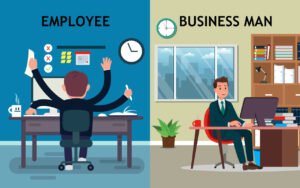Are You an Employee or an Entrepreneur?
In the world of business, two distinct roles stand out: the employee and the entrepreneur. While both play crucial roles in driving the economy forward, they are fundamentally different in their mindset, responsibilities, and approach to work.
In this blog post, we will explore the key differences between an employee and an entrepreneur, shedding light on each role’s unique challenges and rewards.

Employee vs. Entrepreneur
Employees typically seek job security, stability, and a predictable income. They are content with a regular paycheck, benefits, and the knowledge that they are not solely responsible for the success or failure of the company. Employees often prefer a structured work environment with clear roles and responsibilities. The employer determines the employee’s tasks, hours, and pay rate and provides the resources and tools required to perform the job.
Entrepreneurs, on the other hand, thrive on calculated risk-taking and uncertainty. They are willing to invest their time, money, and energy into a venture with the hope (goal) of reaping substantial rewards in the future. Entrepreneurs are comfortable with ambiguity and understand that failure is a part of the journey. They embrace challenges and view them as opportunities for growth. Entrepreneurs are responsible for initiating and developing a business idea, and they take on the risks and challenges associated with starting and growing a business. They create their own systems and processes, decide on tasks to be performed, and set their own hours. Entrepreneurs must build their business infrastructure, develop their products or services, make their own sales and marketing efforts, and manage their finances and operations.
Autonomy and Decision-Making
The level of autonomy and decision-making authority differs significantly between employees and entrepreneurs.
Employees typically have limited autonomy in decision-making. They follow the direction set by their superiors and execute tasks within the parameters defined by their job descriptions. While they may have input on certain matters, ultimate decisions are made by management or business owners.
Entrepreneurs have complete autonomy over their businesses. They make critical decisions, set the vision, and are responsible for the success or failure of their ventures. This autonomy allows entrepreneurs to be agile and pivot quickly when necessary. However, it also means they bear the full weight of responsibility for the outcomes of those decisions.
Self-Motivation and Accountability
Employees often have a boss who sets goals and expectations, provides guidance, and offers feedback on their performance. They may be accountable for specific tasks or projects, but ultimately, their responsibilities and decisions are limited to their job description.
Entrepreneurs, however, must be self-motivated and self-directed. They don’t have an employer to hold them accountable for their work but rather are solely responsible for their business’s success or failure. They must set their own goals and expectations, manage their time efficiently, and hold themselves to high standards to achieve success.

Risk-taking and Initiative
Employees typically aim for job security and often may be unwilling to take risks that could jeopardize their employment or cause disruption to their daily work routine. They may prefer to follow set procedures and processes and refrain from initiating change if it may cause difficulties and confusion.
Entrepreneurs, on the other hand, embrace risk-taking and are eager to seize opportunities. They are willing to take chances, make bold decisions, and pursue new ideas that they believe will benefit their business. They actively seek out new opportunities and continuously adapt their processes to remain competitive.
"An entrepreneur needs to have faith that what they're working for will one day pay off." -Forbes "How To Find Success As An Entrepreneur"
Flexibility and Adaptability
Employees usually operate within a defined structure and set of procedures and may not have the freedom to make quick changes as goals and priorities shift. They have to follow set schedules and may be limited by the resources and assets their employer provides.
Entrepreneurs, on the other hand, must be highly adaptable to change and remain nimble in their approach. They often have to make quick decisions, shift priorities, and adjust their strategies to cope with changing business landscapes. Entrepreneurs must have the ability to pivot and adapt their processes and direction in response to market trends or competitive challenges.

Income and Financial Stability
Employees receive a regular paycheck, often with predictable increases over time. They enjoy the security of knowing when and how much they will be paid, along with benefits such as health insurance, retirement plans, and paid time off. However, their income growth may be limited by annual raises and promotions.
Entrepreneurs do not have a fixed income. Their earnings are directly tied to the success of their businesses. While they have the potential for unlimited income, they also face the risk of financial instability, especially during the early stages of their ventures. Entrepreneurs must be prepared to weather financial challenges and either invest their own money or take on debt to keep their businesses afloat.
Work-Life Balance
Employees typically have a more structured work schedule with defined working hours. They can often separate their work and personal lives more easily, leading to a more predictable work-life balance. Employers are responsible for managing staffing levels to ensure that employees can take vacations and time off.
Entrepreneurs often find it challenging to maintain a work-life balance, especially in the early stages of their ventures. They may work long hours, including weekends and holidays, to establish and grow their businesses. Achieving work-life balance becomes a goal, but it can be elusive as entrepreneurs juggle multiple responsibilities.
Job Security
Employees typically enjoy a degree of job security, especially in larger organizations. They have contracts, employment agreements, and labor laws that protect their rights and provide some level of job stability. However, they are still subject to layoffs, downsizing, and industry fluctuations.
Entrepreneurs face higher levels of job insecurity. Their businesses may thrive one year and struggle the next. Economic downturns, market changes, and unforeseen challenges can pose significant threats to their ventures. Entrepreneurs must adapt quickly to survive in the competitive business world.

Learning and Growth
Employees often have access to training programs, professional development, and career advancement opportunities provided by their employers. They can specialize in their field and climb the corporate ladder, gaining expertise in their chosen area.
Entrepreneurs experience continuous learning through the challenges they encounter in building and running their businesses. They must wear multiple hats, from marketing and sales to finance and operations, which allows them to acquire a broad range of skills. The learning curve for entrepreneurs can be steep, but it is also immensely rewarding.
Conclusion
In summary, the differences between employees and entrepreneurs are profound and extend beyond the obvious distinctions in job roles and responsibilities. These differences encompass mindset, risk tolerance, income, decision-making, work-life balance, job security, and opportunities for growth. While both roles are essential for a thriving economy, individuals must carefully consider their own preferences, goals, and aspirations when choosing between the path of an employee and that of an entrepreneur. Ultimately, the decision should align with their values and long-term vision for their careers and lives.
___
Click here to schedule a casual call with Telanda
“What skillsets should you have to own a franchise?” Blog Post
HubSpot’s “Entrepreneurship vs. Employment” Blog Post
Visit the website | Follow me on LinkedIn
#thefranchiseeducator #franchise #franchising #franchiseownership #franchiseopportunities #business #businessownership #businessopportunities #thefranchiseeducatorblog #career #success #beyourownboss #entrepreneur





